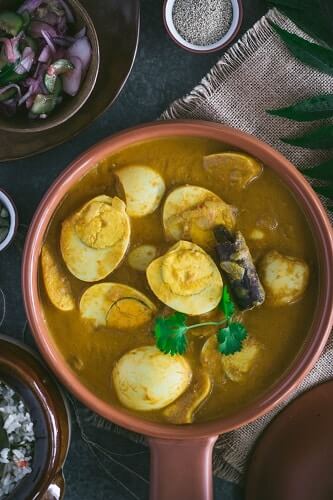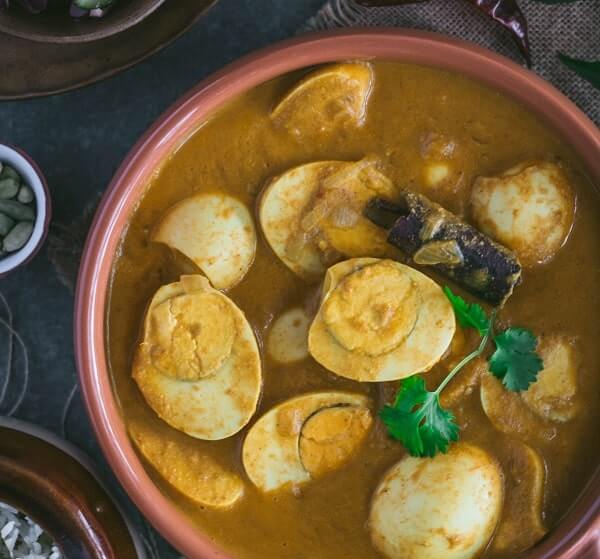Kurma, also referred to as Korma/Qorma, is a traditional Indian curry that has a creamy consistency from the use of yoghurt, spices and aromatics. The preparation of a kurma varies between regions; the North Indian versions often use cream or nut pastes (cashewnuts, almonds) for richness and this also adds to the creaminess of the final curry.
But in the Chettinad version (quite similar to other South Indian versions), the yoghurt and cream are instead replaced by coconut to achieve that creamy consistency. This Chettinad-style kurma also uses poppy seeds, a surprise ingredient but often used in many Chettinad curry pastes for its unique nutty flavour and the creamy thickness it lends to the gravy.
When we think of a kurma, it’s either a vegetarian version or a meat-based version that comes to mind. Egg is an unlikely choice, but you will be surprised just how delicious this choice can be!
This recipe is a great option if you are an egg-etarian or if you prefer to avoid meat during the weekdays yet crave for a rich and delicious curry especially in this freezing winter.
READ ALSO: Egg-sellent preparations

Chettinad egg kurma
- 10 eggs
- 3-4 tbsp vegetable oil
- 1 tbsp ghee/clarified butter
- 2-inch cinnamon bark
- 5 green cardamoms
- 2 small red onions (100gm); finely chopped
- ½ tsp turmeric powder
- 2 tomatoes (approx 1 cup); pureed
- Salt, to season
Wet paste
- 2 tbsp vegetable oil
- 1 tbsp fennel seeds
- ¾ tbsp cumin seeds
- 3 green chillies; slit
- 5 medium garlic cloves; coarsely chopped
- 1-inch piece ginger; coarsely chopped
- 2 tsp white poppy seeds
- 1 tbsp roasted Bengal gram; split
- 10 unsalted cashew nuts
- ¾ cup grated coconut
Hard boil the eggs, shell and slit in half lengthwise. Keep aside.
To prepare the wet paste, heat oil in a large kadhai/wok. When medium hot, add the fennel seeds, cumin, chillies, garlic, ginger and poppy seeds. Fry lightly for 30 seconds to a minute till you begin to get the aroma of the spices.
Next add the split Bengal gram, cashewnuts and coconut; continue to fry on low to medium heat stirring constantly till the coconut starts to get light brown.
Remove from heat and allow to cool. Grind with a little bit of water to get a paste-like consistency.
Heat the remaining oil and ghee in the same kadhai/wok and when medium hot, add cinnamon and cardamom.
When the cardamoms turn plump, add the onions and sauté till translucent. Then add the turmeric powder and continue to sauté for another minute.
Pour in the tomato puree and the ground wet paste; season with salt and mix well to combine. Cook on low heat till the oil has separated from the masala.
Add enough water to get a thick gravy, mix well and continue to cook for another 2-3 minutes.
Finally add the boiled eggs and turn carefully to coat well with the masala. Remove from heat and keep for at least 15 minutes before serving.
Tips
- The key flavours of this egg kurma are in the wet paste. The spices, aromatics, poppy seeds and coconut are slow-roasted to draw out the flavours and then ground to a paste. This is the only step that requires patience and care as to not burn the spices or coconut. The rest of the recipe is super simple and straightforward.
- When making a curry using hard boiled eggs, a good tip would be to slit the hard boiled eggs into halves or to score the eggs lightly lengthwise if you prefer to keep the eggs whole. This allows the eggs to absorb the flavours from the gravy. Egg yolks when drenched in the curry sauce are just out of this world!
- The Chettinad Egg Kurma can be paired with all kinds of Indian flatbreads like parottas, chappatis, rotis, naan etc, but it is best with different types of rice preparations like tomato rice, cumin rice or with hoppers (appams) and string hoppers
READ ALSO: Jaffna Goat Curry: a spicy Sunday roast recipe
Link up with us!
Indian Link News website: Save our website as a bookmark
Indian Link E-Newsletter: Subscribe to our weekly e-newsletter
Indian Link Newspaper: Click here to read our e-paper
Indian Link app: Download our app from Apple’s App Store or Google Play and subscribe to the alerts
Facebook: facebook.com/IndianLinkAustralia
Twitter: @indian_link
Instagram: @indianlink
LinkedIn: linkedin.com/IndianLinkMediaGroup




